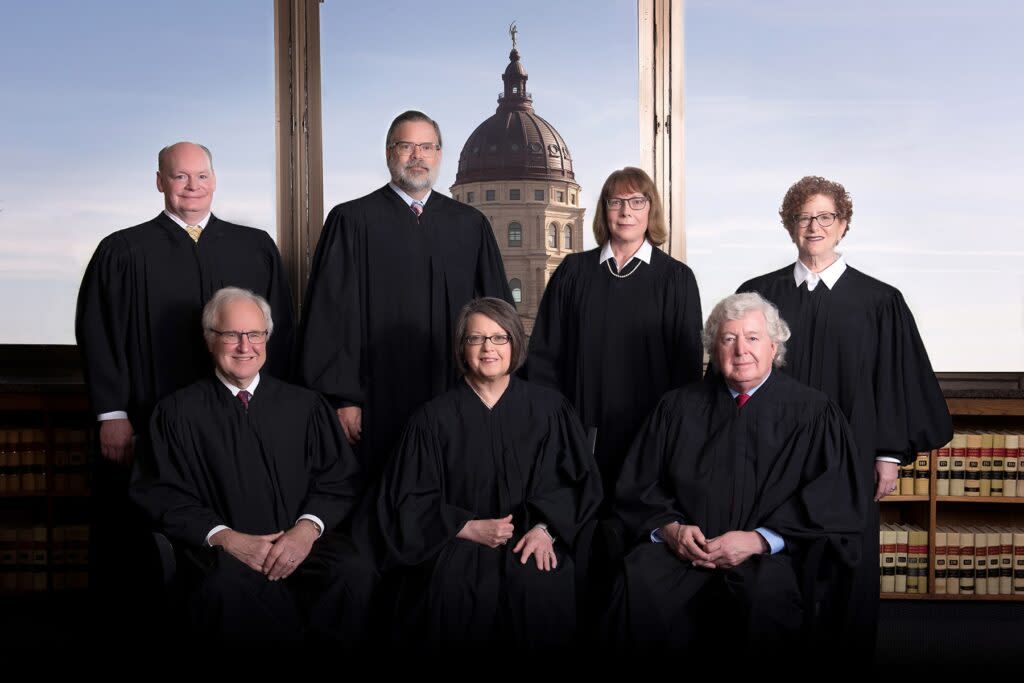Kansas Supreme Court strikes down state law banning second-trimester abortion procedure

Kansas Supreme Court
TOPEKA — The Kansas Supreme Court affirmed Friday the fundamental constitutional right of women to terminate a pregnancy and struck down a state law banning a second-trimester abortion method.
In a separate decision issued simultaneously by the state Supreme Court, the majority declared unconstitutional a state law imposing a wide range of regulations on abortion providers and clinics that far exceeded requirements adopted for medical professionals engaged in comparable health services.
Justice Eric Rosen, an appointee of Democratic Gov. Kathleen Sebelius, wrote for the majority in the abortion procedure case that Senate Bill 95 outlawing termination of pregnancies through a method that could involve dismemberment of a fetus violated the Kansas Constitution’s Bill of Rights.
Alice Wang, a Center for Reproductive Rights attorney representing abortion providers, had argued the law impaired the right of bodily autonomy woven into the state’s Bill of Rights. The court’s majority agreed and concluded the Kansas attorney general’s office failed to prove the impairment could be justified because it was narrowly tailored or served a compelling state interest.
“In short, S.B. 95 does not further patient safety. It compromises patient safety,” Rosen wrote in the opinion. “As the district court found and the state did not contest, SB 95 eliminates a safe and common medical procedure and leaves patients subject to procedures that are rarely used, are untested and are sometimes more dangerous or impossible.”
Anthony Powell, the state solicitor general under Attorney General Kris Kobach, unsuccessfully argued the 2015 law ought to be upheld because it promoted respect for the dignity of human life, shielded interests of innocent third parties and offered fundamental regulation of medical care in Kansas.
Rosen noted Powell urged the state Supreme Court to reverse its 2019 decision that the right to personal autonomy was embedded in the Kansas Constitution and granted Kansans the ability to control “one’s own body, to assert bodily integrity and to exercise self-determination.” That decision, despite the U.S. Supreme Court’s reversal of Roe v. Wade, meant women in Kansas had the right to decide whether to continue a pregnancy.
“The state devoted much of its brief to inviting us to reverse our earlier ruling in this case that the Kansas Constitution protects a right to abortion. We decline the invitation,” Rosen said. “We stand by our conclusion that section 1 of the Kansas Constitution Bill of Rights protects a fundamental right to personal autonomy, which includes a pregnant person’s right to terminate a pregnancy.”
The 2015 Kansas Legislature passed — 98-26 in the House, 31-9 in the Senate — and Republican Gov. Sam Brownback signed into law the Kansas Unborn Child Protection from Dismemberment Abortion Act. It targed the second-trimester abortion method of abortion, often referred to as “dilation and evacuation” or D&E. The law included an exemption to save the life of a pregnant woman facing substantial and irreversible medical impairment.
Before it took effect in 2015, physicians Herbert Hodes and Traci Lynn Nauser, who performed the procedure, filed a lawsuit. A Shawnee County District Court judge issued an order in 2021 in support of the plaintiffs’ plea to permanently enjoin enforcement of the law, but the state appealed. Judges on the Kansas Court of Appeals judges evenly split on the question of whether the Kansas Constitution protected a right to abortion, so the temporary injunction remained in place. The case migrated to the state Supreme Court, which ultimately upheld the district court.
As the case crawled through the Kansas judicial system, the U.S. Supreme Court declared in June 2022 the U.S. Constitution didn’t protect abortion rights and states could impose abortion bans. In August 2022, Kansas voters rejected 59% to 41% a proposed state constitutional amendment that would have nullified the state Supreme Court decision in 2019 and established there was no “right to abortion” in Kansas.
“Kansas voters made it loud and clear in 2022: The right to abortion must be protected,” said Nancy Northup, president and CEO of the Center for Reproductive Rights. “This is an immense victory for the health, safety and dignity of people in Kansas and the entire Midwestern region, where millions have been cut off from abortion access. We will continue our fight to ensure Kansans can access the essential health care they need in their home state.”
Justice K.J. Wall, who was appointed by Democratic Gov. Laura Kelly, recused himself from the D&E abortion case. The 5-1 decision didn’t alter state law allowing most abortions until the 22nd week of a pregnancy.
Justice Evelyn Wilson, also appointed by Kelly, wrote a concurring opinion in the dismemberment abortion case. She said SB 95 was unconstitutional because it was written by the Legislature in a vague manner. It improperly left physicians vulnerable to criminal prosecution and the view of juries that could weigh evidence based on standards other than reasonable medical judgment, she said.
“In my view, the Legislature’s omission of any discernable standard means the physician’s expert decision will inevitably be second-guessed by prosecutors, judges and juries applying a personal and ultimately mysterious standard to the physician’s conduct,” Wilson wrote.
In the lone dissent, Justice Caleb Stegall said the 2019 decision affirming a right to abortion in Kansas as well as the majority’s latest opinion “bears no resemblance at all — in either law or history — to the actual text and original public meaning” of Section 1 of the state constitution’s Bill of Rights.
Stegall, who was appointed to the Supreme Court by Brownback, said the majority’s decisions on abortion were consequential because they altered structure of state government. The abortion cases magnified state power and used that authority to grant a “regulatory reprieve to the judicially privileged act of abortion.”
“It is noteworthy that the majority cannot bring itself to acknowledge the government’s compelling interest in unborn human life,” Stegall wrote.
The post Kansas Supreme Court strikes down state law banning second-trimester abortion procedure appeared first on Kansas Reflector.

